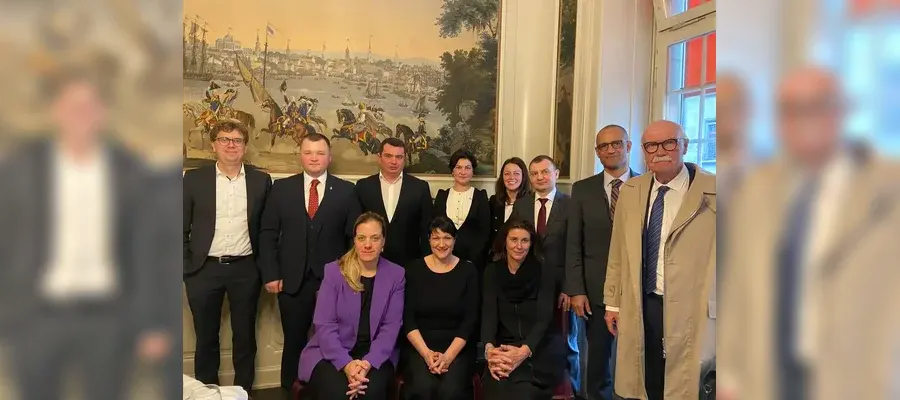
The National Agency on Corruption Prevention (NACP) of Ukraine and the Basel Institute on Governance (Switzerland) have agreed to cooperate on tracing and recovery of assets illegally transferred from Ukraine. The agreement was reached during a working visit of Artem Sytnyk, Deputy Head of the National Agency on Corruption Prevention (NACP), to Switzerland.
The Basel Institute on Governance is an independent, non-profit organisation dedicated to fighting corruption and improving governance worldwide. The Basel Institute’s International Centre for Asset Recovery is renowned for providing support to governments in investigating and prosecuting financial crimes and recovering illicit assets.
Gretta Fenner, Managing Director, noted that the Institute has been working fruitfully with Ukraine, in particular with the National Anti-Corruption Bureau (NABU), General Prosecutor Ofiice, Special Anti-corruption Prosecutor office, (SAPO), State Bureau of Investigations, the Ministry of Infrastructure, and Ukrainian Railways, providing expert and technical support. She looks forward to extending that close cooperation with NACP.
Challenges with international cases
NACP often faces challenges related to the transnational nature of large-scale corruption cases. When checking the declarations of public officials or monitoring their lifestyles, for example, it must often establish the location of illegally acquired assets transferred abroad. Evidence from other countries is required to form the basis for criminal proceedings that are submitted to the High Anti-Corruption Court of Ukraine.
This is a constant challenge, since corrupt officials from Ukraine often try to take money out of Ukraine or buy real estate in Spain, Austria, Croatia and Italy. Artem Sytnyk cited the most striking examples, including the case of military commander Borysov and others.
NACP and the Basel Institute on Governance plan to formalise their relationship with a memorandum of cooperation in the near future and start working together using the Institute's capabilities. This includes the use of new digital tools and training of NACP employees who are involved in investigating and building cases around the acquisition of unjustified assets. As a starting point, many of the Basel Institute’s free eLearning courses on asset tracing and international cooperation are already available in Ukrainian.
Artem Sytnyk said:
"Establishing evidence of the illicit enrichment of officials and bringing them to justice is exactly what Ukrainian society expects. We must make every effort to ensure that the perpetrators are not allowed to keep their illicitly obtained assets, and we need the support of our partners on this path."
Among other things, the Basel Institute team was interested in how NACP currently organises its system of declarations and how it verifies declarations. The team expressed their readiness to support the agency's work.
Fostering Swiss-Ukrainian cooperation and understanding
As part of his working visit to Switzerland, Artem Sytnyk also took part in a meeting with Alexandra Baumann, Head of the Prosperity and Sustainability Division, Federal Department of Foreign Affairs (FDFA) of Switzerland. In addition to her team, also present were Swiss Parliamentarians, Ambassadors and representatives of the Swiss Agency for Development and Cooperation and the FDFA's Directorate of Public International Law. The participants were interested in how Ukraine prevents and combats corruption. This issue is extremely important for international partners during negotiations on the next steps to support Ukraine.
Artem Sytnyk informed the partners about Ukraine's progress in the anti-corruption fight, citing examples of legislative changes, specific cases of high-profile detentions of top officials, sociological research data, and Ukraine's progress in the Transparency International ranking.
The Ambassador of Ukraine to Switzerland and the Principality of Liechtenstein, Iryna Venediktova, emphasised the importance of strengthening the institutional capacity of the anti-corruption infrastructure and the Ukrainian authorities in general, and noted that the current priority is to strengthen the judicial system to ensure fair justice for corrupt officials.
A transparent Restoration
The partners were interested in the transparency of the Restoration (reconstruction) process and emphasized the need to promote and operate the DREAM platform. This is a digital ecosystem for the transparency management of Restoration projects. It collects, organises and publishes open data at all stages of the projects and has so far proven to be highly effective.
The meeting participants were also interested in the introduction of a corruption whistleblowing institution in Ukraine (whistleblower portal: https://whistleblowers.nazk.gov.ua ) and maximum involvement of civil society in monitoring the transparency of the use of funds for Restoration and other important processes.
The topic of cooperation between the public sector and anti-corruption agencies was also raised. Both NABU and NACP have public councils that take an active part in the selection of employees for senior positions and other important decisions. The partners touched upon the topic of possible corruption risks linked to compensation for the damage caused by Russia. Artem Sytnyk responded that the Ministry of Economy of Ukraine is responsible for this process, but NACP will monitor and investigate risks in this area.
Summing up the current status, Gretta Fenner noted that Ukraine's progress in fighting corruption over the past 10 years is definitely significant, but there is still much to be done. This is why it is so important for those on the front lines of fighting corruption in Ukraine connect with international partners keen to support their fight.



